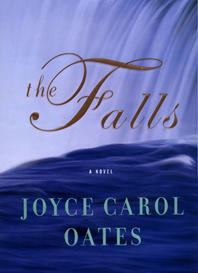
The Falls
Joyce Carol OatesReview by Mary Matus
Taking on city hall is often romanticized, but Joyce Carol Oates shows
how it can have disastrous consequences in her latest book, The Falls.
The Falls begins with the story of Ariah Erskine, whose husband commits suicide on the first day of their honeymoon at Niagara Falls in 1950. In the wake of tragedy, Ariah finds love with wealthy lawyer Dirk Burnaby.
The couple's happiness does not last long. Dirk soon finds himself intrigued by a seemingly hopeless case popularly known as Love Canal.
History buffs know that the Love Canal case involved a Niagara Falls neighborhood taking on large corporations after poorly disposed of waste caused a variety of illnesses.
Burnaby is depicted as the first man to try to take on the case. Because Dirk is wealthy and well connected, his involvement in the case against the large corporations causes him to be called "a traitor to his class." Alienating both family and friends, it can only end in heartbreak.
The last section of the book centers on the couple's three children. Each of them has a very unique personality, and the reader will want the children to learn about the past that has been hidden from them for 15 years. All three are very well rounded characters whom the reader will learn to care about, and may find it heartbreaking as they seem to have problems finding themselves.
If there is a weak point in the book, it is the heroine, Ariah. Ariah's weak, nervous personality may be explained by the traumatic experience with her first husband. Ariah becomes standoffish and seems to have no life outside the family. One of her more frustrating characteristics is how she won't read newspapers or watch the news, because she doesn't want to worry about events that don't concern her or her family. It may not seem to be much of a stretch that a woman before the feminist movement still considers politics a man's world. However, the reader may wish Ariah had a more active role.
Dirk's story and his downfall will fascinate readers. While Dirk may be admirable for his passion, Oates shows how passion can have consequences. The passages detailing Dirk's downfall are compelling but may be frustrating at time for the readers. It is natural to want the hero to prevail. It is natural to want the lone crusader to win against the big corporations. It is natural to want a happy ending.
However, as is often typical in Oates' works, Dirk's crusade does not end happily. The reactions of Dirk's family and friends may seem extreme, but readers may ask themselves how supportive they would be if someone they cared about made so many sacrifices for a seemingly helpless cause.
Oates does not romanticize Dirk's struggle. She portrays Dirk's fight
for justice realistically and illustrates how crusaders are not always
praised until it is too late.
Ecco, 2004: ISBN 0060722282